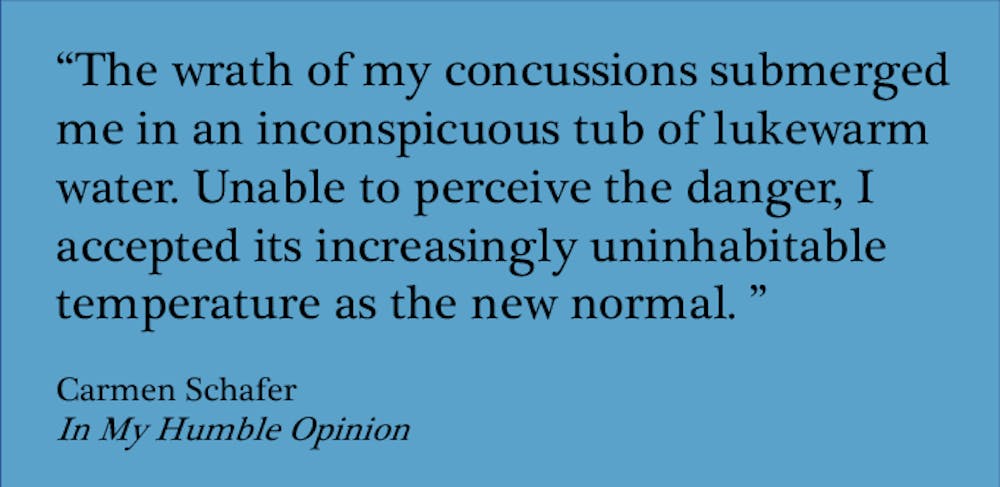
Name: Carmen.
Year: Freshman.
Major(s): History and Economics.
Hometown: Seattle.
Fun Fact: I’ve had seven concussions.
Crafted and perfected during the first month of freshman year, this is the default recipe I use to introduce myself — served in complete sentences, of course.
Admittedly, my fun fact isn’t particularly fun, but it’s still my go-to and easily the only good thing that resulted from the seven concussions I sustained throughout high school, mostly during sophomore year.
Long before my seventh concussion, my loving parents and concerned pediatrician insisted I quit playing volleyball. Blinded by my naive assumption that a traumatic brain injury (TBI) was temporary, a wound that time could and would heal, I insisted that they were overreacting.
Yet despite potent doses of restorative sleep and wishful thinking, my saga of serial concussions left me with more than just a go-to fun fact.
Supposedly, if you place a frog in boiling water, it will die immediately. However, if you place a frog in lukewarm water and slowly raise the temperature, unable to perceive the danger, it will die slowly.
On top of noticeable cognitive damage — which, though frustrating, I learned to manage before college — the wrath of my concussions submerged me in an inconspicuous tub of lukewarm water. Unable to perceive the danger, I accepted its increasingly uninhabitable temperature as the new normal.
I grew numb to being boiled alive until I was being boiled to death.
My brother is named after Kurt Vonnegut. However, because I’m an uncultured swine, I’m regretfully unversed in Vonnegut’s literature. Nevertheless, because I belong to a generation of uncultured swine, I also happen to use Instagram. That’s how I stumbled across (and double-tapped) this Slaughterhouse-Five quote: “How nice — to feel nothing, and still get full credit for being alive.”
For two years, I was given credit where credit was not due. I felt nothing. Nothing but emptiness. Nothing but the weight of the world.
I grew to accept it. The coldness. The numbness. The chronic lethargy. I grew to accept it as if it was all I had ever known, all that I ever was.
I got used to it, and so did everyone else.
By the end of high school, everyone in my life, especially me, had accepted that I had a depressing personality. But a mood disorder is not a personality trait.
You answer a lot of questions during your first few months of college. Besides the standard formalities (name, major, hometown), at the top of my frequently asked question bank — trailing closely behind “Doesn’t it rain a lot there?” — perched this gem:
“Why do you never smile?”
Carmen.
History and Economics.
Seattle.
It’s more of a drizzle.
As for why I never smiled, my answer was usually a cocktail of confusion and denial. In hindsight, the answer is obvious. But because I was used to it, because happiness had become a stranger to me, I did not have the words, let alone the comprehension, to answer accurately. I had forgotten what it was like to feel alive. I had forgotten what it was like to feel anything.
While it was rather troubling to have people I had just met question why I never smiled, I didn’t know what was wrong with me, because I didn’t know that there was something wrong with me. This question, in conjunction with the less frequent but even more probing, “Are you ever happy?” made me realize, at last, that the water was too damn hot.
I can’t live like this.
I shouldn’t live like this.
I don’t have to live like this.
So why did I?
Because it was all in my head.
A year before my diagnosis, my doctor tested me for anemia and thyroid issues. Because those tests came back negative, she disregarded the symptoms that had originally prompted those tests. I had no detectable physical ailment, and therefore I had to be perfectly healthy.
When you battle physical illness, you are hailed a hero, but when you struggle with mental illness, you are considered a liability. A bad cold warrants a doctor’s note and a day off, but poor mental health is a bad excuse for having a bad day.
In high school, my college counselor cautioned me to not write about mental health in my college essays. The same attitude probably applies to anything tied to my name. Yet it wouldn’t be college if I didn’t make decisions that could potentially jeopardize my future.
But here’s the good news, admissions officers and future employers: It gets better.
This past weekend, I kept thinking to myself, “I’m so happy to be alive.” I’m still not completely used to it, and I hope I never become used to it.
Even though we can’t expect every day of our lives to treat us like Spring Fair does, I implore you to never mistake a bad day, or even a bad two years, for a bad life.





